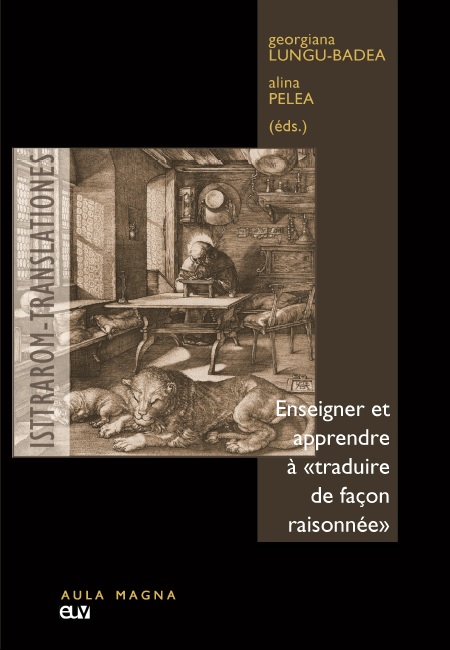
We kindly inform you that, as long as the subject affiliation of our 300.000+ articles is in progress, you might get unsufficient or no results on your third level or second level search. In this case, please broaden your search criteria.

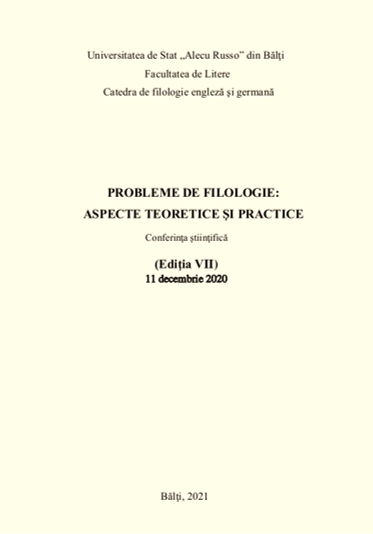
Reading in French is far from easy, in the sense that its letters pose different problems. In this article, we try to describe some regularities in reading the letter "o". Their presentation is based on the principle of the proximity of the letter in question.
More...
The present approach presents a synthesis of ideas concerning a group of German suffixes whose affixation to the adjective, substantive or verbal root of an adjective often implies differences in meaning. Starting from the elucidation of the etymology of each suffix analyzed in the article, both the ways of forming adjectives with these suffixes and the influence of their semantics on the meaning of adjectives are discussed.
More...
The article aims to define the role of teaching vocabulary at the secondary level. Methodists say that teaching vocabulary is an important element in developing and strengthening students' speaking skills. Vocabulary enrichment is very important for cultivating students' ways of expressing themselves and is done systematically in English language lessons. But this is not just about noticing or learning new words. It is shown that in order to achieve the cognitive finality of the new lexical units, they must be explained and used in the right context. It is obvious that a rich vocabulary contributes to effective communication in different situations. But at the same time, we should not forget that vocabulary is taught along with other important components, such as grammar, spelling, and pronunciation.The article also reflects the views of well-known linguists on the role of vocabulary in language acquisition, its aspects and classification, as well as the stages of vocabulary acquisition at secondary school
More...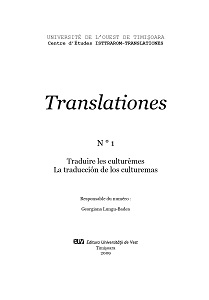
As part of a more extensive research on the cultural aspects of the translation of folktales, our paper tackles the issue of folktales characters’ names from the perspective of their status as culturemes and translation units. We identify here a series of cultural and linguistic features. Their role is to highlight the full meaning of these names and thus provide a relevant tool both for the translator and the researcher undertaking descriptive translation studies. Our suggested analysis model is completed by examples of translation from Romanian into French.
More...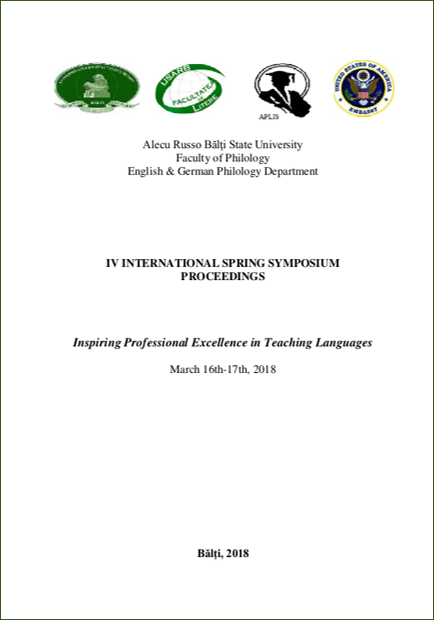
The article studies the lexical-semantic field "Greed" in the German and Russian languages. The relevance of the study of the problem of lexical-semantic fields is attributed to the fact that, the field, representing in itself the hierarchical structure of the set of lexical units which are united by a common meaning and reflecting a certain conceptual sphere in the language, allows to establish the diverse aspects of its lexical units, to identify their nationally specific features. The structure of lexical-semantic groups of nouns, adjectives and verbs that make up this lexical-semantic field in both languages is analyzed by means of definitional and componential analyses. The paradigmatic connections between its components are determined and analyzed and on this basis, the general and specific features of the lexical means of verbalization of the studied lexical-semantic field in the German and Russian languages are defined.
More...
The study aims to investigate the level of pragmatic competence of Romanian learners of English when performing requests in academic email interaction. It focuses on the analysis of the linguistic form of authentic email requests written by students of USARB (Alecu Russo Balti State University) to faculty. The study examines the way politeness is expressed in academic email requests by analysing the level of directness employed, as well as the use of internal modification of the head act of request. The findings reveal cases of negative transfer of strategies from students’ mother tongue into English. This stresses the need for pragmatic instruction, which will contribute to developing the EFL learners’ pragmatic competence.
More...
The article explains the possibilities of the use of active methods in the process of studying “Theory and Methods of Children’s Speech Development” course by students. The work presents the classification of active teaching methods, demonstrates the ways of using the brainstorming method, role-playing (dramatizing/staging) and the method of solving pedagogical situations at practical classes. The author has proved that namely active methods are the most pedagogically valuable ones in professional education.
More...
Delisle, Jean, Woodsworth, Judith (dir.), "Les Traducteurs dans l'histoire". Ottawa : Les Presses de l'Université d'Ottawa, 2e éd., 2007, xxiii-393 p. ISBN : 978-2-7603-0652-3
More...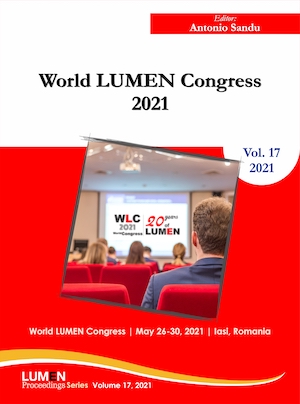
The paper explores the interface between the new theoretical approach of ecolinguistics and language educational practices in the new digital environments that we have plunged into during 2020-2021. From the standpoint of ecological communication and eco-semiotics, the exploration highlights its impact on language learning and education in general, as re-contextualized in the new digital spaces we have all been experiencing as educators and learners. The theoretical input from semiotics and conceptual linguistics on the one hand, and educational ecology on the other hand, is paired with a direct empirical analysis of the students’ language learning experience at the USAMVBT University of Timisoara, Romania, the University of Tetova, North Macedonia, and Lomza State University from Poland. Our aim is to better understand how to sustain students’ communicational skills and their overall adaptation to the emerging digitalised educational environment across fields of study.
More...
The article deals with the modern approaches of teachingforeign languages in school. Clarified modern methodology in teachingforeign languages in school. Innovative methods that improve the efficiencyof learning English in the classroom in high school are described. The use ofinnovative methods in educational institutions has the potential not only toimprove education, but also to empower people, strengthen governance andgalvanize the effort to achieve the human development goal for the country.with a number of educational options available before the present generationlearners, the newer trends seem to have emerged in the field of education thathave entirely changed the face of traditional system of education. Recent trends, methodologies and developments portray the vital role of education sector in general with its internalization of the education process, stress on quality above quantity, increase in the adoption of technologies, necessity for professional talent. Methods of teaching English have developed rapidly,especially in the previous years. As a language learner, training manager, or teacher, it is important to understand the various methods and techniques so that you are able to navigate the market, make educated choices, and boost your enjoyment of learning a language.
More...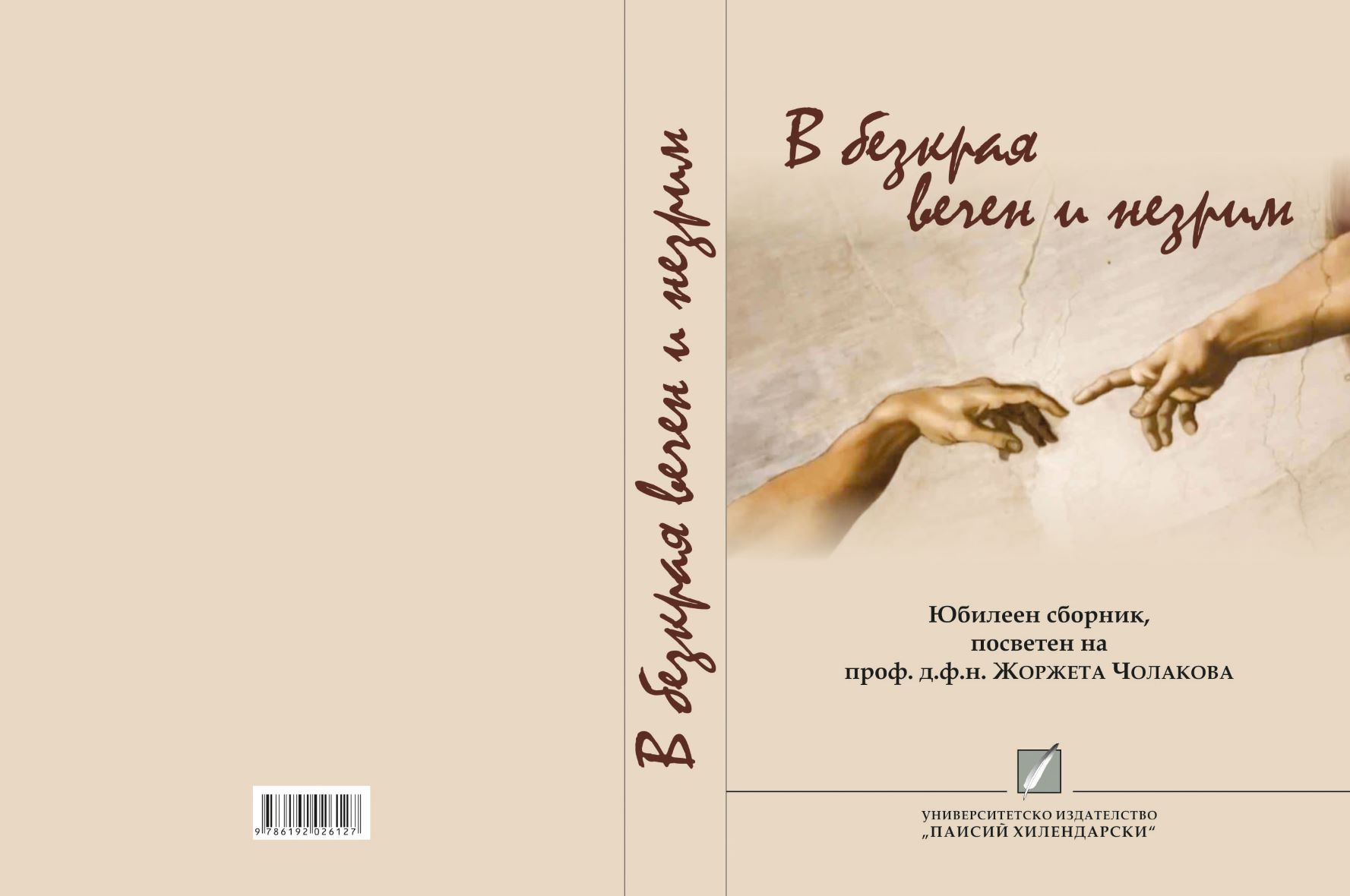
The present paper dwells on two instances of the Bulgarian theatrical adaptation of Dziady in 1937/1938 and two later contemporary performances in 2009 and 2014. These stage adaptations demonstrate the ongoing Bulgarian interest in both the translatability of the text and its stage life as a work that has a persisting vitality in the context of Bulgarian reception. More immediately, the study focuses on the connectedness of the first and only comprehensive translation of Dziady (by Slava Shtiplieva, whose translated version becomes subject to further modifications and assessments by the philologist Lyubomir Andreychin and the poet Nikolay Liliev when intended for stage dramatization) and the visiting theatrical performance set on the stage of the Bulgarian National Theatre by Leon Schiller и Andrzej Pronaszko, with Bulgarian actors, in 1937. The performance represents a significant achievement in the Bulgarian reception trigger ing far-reaching media responses and gathering a large number of prominent Bulgar ian authors and intellectuals. The event sparked heated debates. Slava Shtiplieva’s translation itself, published in 1938 as a separate book, has been subject to numerous critical assessments. The second point of concern here is the writer and translator Blaga Dimitrova’s translation of Conrad’s famous monologue known as “Wielka improwizacja” (“The Great Improvisation”), which is considered more accomplished in terms of poetic achievement and which provides the basis of two subsequent theatrical interpreta tions directed by Nikolay Georgiev, the founder of Alma Mater Sofia University Theatre and the disciple of Kazimierz Dejmek and Jerzy Grotowski. In 1968 (when Dejmek’s adaptation of Dziady was officially banned in Poland) Georgiev was like wise compelled to suspend his lecturing activities and had to leave for the country side. In 2009 and 2014 he set two theatrical performances based on Dziady. The included interview with the stage director offers further insight into the Bulgarian reception of the play and its forms of continuous reassessment.
More...
Josip Osti (1945 – ) is one of the contemporary writers whose works reveal remarkably pronounced openness towards, and dialogic connection with, World Literature. Prague and Czech literature occupy a special position in his poetic world. Since he transforms every single poetry volume of his into a “literary home”, Osti re-instils literature with its sacral meaning and role as a defender of meaning and memory. His wonderful verses remember places and landscapes, authors and works. Thus, Golden Prague as well as Jaroslav Hašek, Milan Kundera, Bohumil Hrabal, Miroslav Holub and other Czech writers have their vivid presence in the books of the Bosnian-Slovenian writer, reminding us that for Josip Osti books are much more than fine art objects; they are “angels and home deities”.
More...
The current text presents Jean Orizet’s point of view toward the basic concept of his works for “entretemps”. The specific understanding of this concept allows transitions across different by nationality creators and works, which are individually utilized so as to serve as an alphabet for the new creation. Their insertion in the author’s text is regarded here as building elements without which “the awakening” of the subjective voice would not be possible. The artistic parameters of the selected “stories from entretemps” allows for the building of a “concentric-circular work with quotations, echoing and references, leaning towards universal human union”.
More...
The German and Bulgarian versions of the poetry collection “Assisi Sonnets” by the political émigré Hristo Ognyanov appeared in a rarely encountered disposition – the translation (1986) came out before the original (1992) in reaching their respective readers. The essay strives to elucidate a number of questions that arise from such a discrepancy but its primary goal is to reconstruct the complex range of cultural relations in the dialogic network of the Assisi sonnets. The juxtaposition between the canonical hagiography of St. Francis of Assisi, the poetic texts and their renditions in translation throws into relief the presence of Bulgarian Orthodox Christian iconography but at the same time reveals the attempts of the German translation to “discipline“ the sonnet visions, to bring them closer to what is considered acceptable for the Catholic audience of readers.
More...
Paremias are phraseological units (PUs) that constitute speech acts in their own right. With the help of examples taken from contemporary Spanish novels translated into Bulgarian, we demonstrate that, just like other phraseological units, paremias have variations and different connotations that sometimes require the translator to consider different possibilities in order for the paremia to fit in the context.
More...
The paper deals with the quasitoponym “Kocourkov”, also “Kocúrkovo”, which not only occurs in Czech and Slovak phraseology, but also works as a specific allegory. “Kocourkov/Kocúrkovo” is a fictional locality characterized by a specific structure of its population. In the paper we map its occurrence in Czech and Slovak literature and film and we also reveal the motivation for naming fictitious localities with these quasitoponyms.
More...
Thе paper investigates the terms in Regulation (EU) 2017/746 in three language versions: Bulgarian, Polish, and English, as a representative case of the Public health terminology in European Union law. The source and the outer form of the terms are being compared. All Slavic terms in the Regulation are calques, whereby phraseological calques and loan blends are most frequent. The main difference between the grammatical structures of the terms in the compared languages is due to conversion as a typical morphological operation in English. The dominant structural type in all three languages is multi-component terms, with the prevalence of two-component terms.
More...
Periodization is a method of categorizing systematically the processes in a given field with regard to its historical past. The central issue that emerges here is how to approach the task so as to bring to the fore those phenomena that delineate one period from another. This text outlines the various visions of eminent Czech scholars who have aimed to charter the periodization of Czech literary language.
More...
The strategies in Branislav Nušić’s comedies, observed in analysis from the perspective of linguistic stylistics, through the interdisciplinary method, described, named and justified in the present work, are: the effect of fireworks, a/symmetry; the effect of expecting the unexpected; the co-ordinate system for the development of comedic action; the sign character of objects; the “closed” rondo-composition, against the background of the linguistic and stylistic techniques typical of the writer of comedies and elements of his poetics: cumulation, abundance, aberration, irradiation and integration of stylistic means from all linguistic levels forming the stylistic code of the comic (not considered in detail). The key scenes that served as a basis for reflection are from the comedy “A Member of the Parliament”, but the conclusions are also based on “A Suspicious person”, “PhD”, and “The Cabinet Minister’s Wife”.
More...